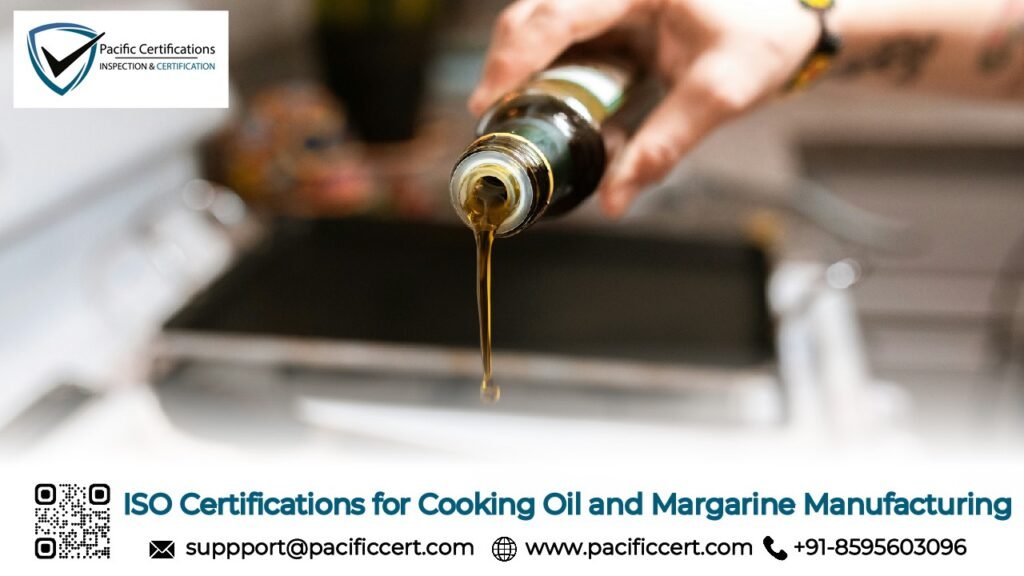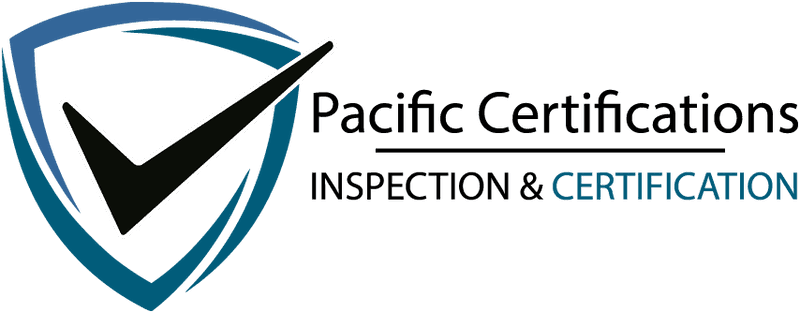
ISO Certifications for Cooking Oil and Margarine Manufacturing Businesses, Requirements and Benefits
In today’s fast-paced and health-conscious world, the food manufacturing industry faces increased scrutiny from consumers, regulatory bodies, and stakeholders alike. The cooking oil and margarine manufacturing sector is no exception, as companies strive to meet stringent food safety and quality standards. ISO certifications provide a solid framework for ensuring quality & safety. These standards help businesses in the cooking oil and margarine manufacturing industry maintain high standards, which, in turn, builds consumer trust and enhances efficiency.
ISO standards such as ISO 9001 for quality management, ISO 22000 for food safety, ISO 14001 for environmental management, and ISO 45001 for occupational health and safety are particularly relevant to cooking oil and margarine manufacturers. Implementing these standards can provide a significant marketing value while helping companies meet regulatory demands and exceed customer expectations.
If you’re seeking ISO certification for your Cooking Oil and Margarine Manufacturing business, reach out to us at support@pacificcert.com or call us at +91-8595603096.
Applicable ISO Standards for Cooking Oil and Margarine Manufacturing
The cooking oil and margarine manufacturing sector benefits from a range of ISO standards designed to address the specific requirements of food production, safety, quality, and environmental and health responsibilities. Key standards applicable to this industry include:
- ISO 9001: Quality Management Systems: ISO 9001 sets out the criteria for a quality management system (QMS) and is based on principles such as customer focus, leadership, and continual improvement. For cooking oil and margarine manufacturers, ISO 9001 certification demonstrates a commitment to consistent quality, ensuring that products meet consumer expectations.
- ISO 22000: Food Safety Management Systems: ISO 22000 specifies the requirements for a food safety management system (FSMS) and is designed for organizations across the food supply chain. In cooking oil and margarine production, ISO 22000 certification ensures a robust framework for managing food safety hazards, reducing contamination risks, and protecting consumer health.
- ISO 14001: Environmental Management Systems: Environmental responsibility is increasingly critical in food manufacturing. ISO 14001 sets the framework for an environmental management system (EMS), helping companies minimize their environmental footprint. By adopting ISO 14001, cooking oil and margarine manufacturers can implement processes to reduce waste, manage resources efficiently, and address environmental concerns.
- ISO 45001: Occupational Health and Safety Management Systems: Workplace safety is paramount in food production. ISO 45001 provides a framework to enhance employee safety, reduce workplace risks, and create safer working environments. For manufacturers in the cooking oil and margarine sector, this standard is invaluable for ensuring compliance with safety regulations and fostering a culture of safety within the organization.
- ISO 50001: Energy Management Systems: ISO 50001 enables manufacturers to implement systems that improve energy efficiency, reduce consumption, and lower operational costs. This standard helps companies manage energy use effectively, aligning their operations with sustainable practices.
- ISO 17025: Testing and Calibration Laboratories: Quality assurance is essential in cooking oil and margarine production, where accuracy in testing and calibration is crucial. ISO 17025 is the standard for testing and calibration laboratories and ensures reliable test results, making it indispensable for quality control in the food manufacturing industry.
Click here to find out more applicable standards to your industry
At Pacific Certifications, we specialize in providing audit and certification services for a wide range of ISO standards. We understand the unique challenges that cooking oil and margarine manufacturers face and can assist in verifying compliance with applicable ISO standards, including ISO 9001, ISO 22000, ISO 14001, ISO 45001 etc.
Our team of auditors and certification professionals works closely with each client to ensure a seamless audit and certification process, tailored to the specific requirements of the cooking oil and margarine industry. By partnering with us, manufacturers can gain confidence that their processes meet internationally recognized standards, which can enhance brand reputation, improve operational efficiency, and increase customer trust.
For expert assistance with ISO certification in Cooking Oil and Margarine Manufacturing, email us at support@pacificcert.com or phone +91-8595603096.
Requirements of ISO Certifications for Cooking Oil and Margarine Manufacturing
Each applicable ISO standard has specific requirements tailored to different aspects of manufacturing. Below is a closer look at what these standards entail:
- ISO 9001 Requirements: ISO 9001 emphasizes the need for a quality management system that is well-documented and continually improving. The key requirements include a commitment to customer satisfaction, strong leadership, clear roles and responsibilities, and effective internal audits. This standard also requires risk management and evidence-based decision-making.
- ISO 22000 Requirements: ISO 22000 includes several unique requirements for food safety, such as establishing critical control points (CCPs) to prevent hazards, implementing food safety management protocols, conducting hazard analyses, and ensuring robust communication along the supply chain. Continuous monitoring, verification, and corrective actions are essential to maintain food safety standards.
- ISO 14001 Requirements: The focus of ISO 14001 is on identifying and managing environmental impacts. Cooking oil and margarine manufacturers are required to develop an environmental policy, establish objectives to reduce environmental impact, track compliance with environmental regulations, and implement controls to manage waste, emissions, and resource usage.
- ISO 45001 Requirements: ISO 45001 necessitates a comprehensive occupational health and safety management system. Key requirements include hazard identification, risk assessments, and setting health and safety objectives. The standard also emphasizes employee training, emergency preparedness, incident reporting, and continual improvement to create a safe working environment.
- ISO 50001 Requirements: ISO 50001 requires organizations to develop an energy management policy, set energy performance goals, and implement systems to monitor and reduce energy consumption. Regular audits, energy reviews, and continuous improvements are central to achieving energy management objectives.
Ready for ISO certification in Cooking Oil and Margarine Manufacturing? Reach out to us at support@pacificcert.com or by phone at +91-8595603096.
Benefits of ISO Certifications for Cooking Oil and Margarine Manufacturing
Implementing ISO standards offers numerous benefits to cooking oil and margarine manufacturers, from operational improvements to market competitiveness:
- Quality and Safety: ISO 9001 and ISO 22000 ensure that products consistently meet quality and safety standards, which is essential for protecting consumers and maintaining trust. Reliable quality and food safety management systems minimize risks associated with contamination, recall, or non-compliance.
- Market Access and Consumer Trust: ISO certifications signal a commitment to quality, safety, and sustainability, which can increase market access. Many retailers and suppliers prefer to work with certified companies, as these standards guarantee a high level of reliability and compliance.
- Efficiency and Cost Savings: ISO standards such as ISO 50001 (energy management) enable companies to streamline operations, optimize energy use, and reduce waste, leading to significant cost savings. ISO 9001 also drives efficiency by focusing on continuous improvement and effective resource utilization.
- Sustainability: With ISO 14001, companies can demonstrate their commitment to environmental stewardship. This is increasingly important in today’s market, where eco-conscious consumers and stakeholders value companies that prioritize sustainability.
- Compliance with Regulations: Adopting ISO standards helps companies comply with industry regulations, minimizing the risk of fines, recalls, and legal issues. Standards such as ISO 22000 and ISO 45001 ensure compliance with food safety and occupational health regulations, respectively.
- Workplace Safety: ISO 45001 enables organizations to create safer working conditions, reducing accident rates and promoting a healthy work environment. This can result in lower absenteeism, increased productivity, and higher employee morale.
Ensure quality and compliance with ISO certification for your Cooking Oil and Margarine Manufacturing. Contact support@pacificcert.com or call +91-8595603096 today.
Market Trends
The cooking oil and margarine industry continues to evolve, driven by consumer demand for healthier, eco-friendly products and stringent regulatory requirements. According to recent research, the global cooking oil market is expected to witness substantial growth in 2024, fueled by the increasing demand for plant-based oils and organic products. Manufacturers are also focusing on sustainable production methods, reducing waste, and minimizing environmental impact. ISO certifications, particularly ISO 14001 and ISO 50001, are essential for companies looking to meet these new demands and align with sustainable business practices. Furthermore, with the ongoing focus on health and safety, ISO 22000 and ISO 45001 have become even more crucial in ensuring safe, high-quality products and safe work environments.
Achieving ISO certification can unlock significant benefits for cooking oil and margarine manufacturers. By obtaining ISO certifications, you’re not only ensuring high-quality, safe, and sustainable production processes, but you’re also building trust with consumers, improving operational efficiency, and gaining a competitive edge in the market.
If you’re ready to take the next step toward ISO certification, reach out to Pacific Certifications. Our team of experts is here to guide you through the audit and certification process.
Pacific Certifications is accredited by ABIS, in case you need support with ISO certification for your Cooking Oil and Margarine Manufacturing business, please contact us at support@pacificcert.com or +91-8595603096.
FAQs: ISO Certifications for Cooking Oil and Margarine Manufacturing
ISO 22000 is critical for managing food safety hazards, ensuring that cooking oil products are safe for consumption and compliant with regulatory requirements. It helps establish a food safety management system that minimizes contamination risks.
ISO 9001 ensures consistent product quality by requiring a well-documented quality management system. For margarine manufacturers, this standard ensures that each batch meets quality specifications, fostering customer satisfaction and reducing waste.
ISO 14001 helps cooking oil manufacturers reduce their environmental impact by optimizing resource use, managing waste, and lowering emissions. This certification also enhances brand reputation as consumers increasingly prefer environmentally conscious companies.
ISO 45001 provides a structured approach to identify and mitigate workplace hazards, improving employee safety. For cooking oil and margarine manufacturers, this is essential for maintaining a safe production environment and reducing risks.
The certification process typically involves a gap analysis, documentation review, audit preparation, and formal audit stages. Pacific Certifications can guide you through the audit and certification stages, ensuring a smooth and successful certification journey.
Read More at: Blogs by Pacific Certifications






